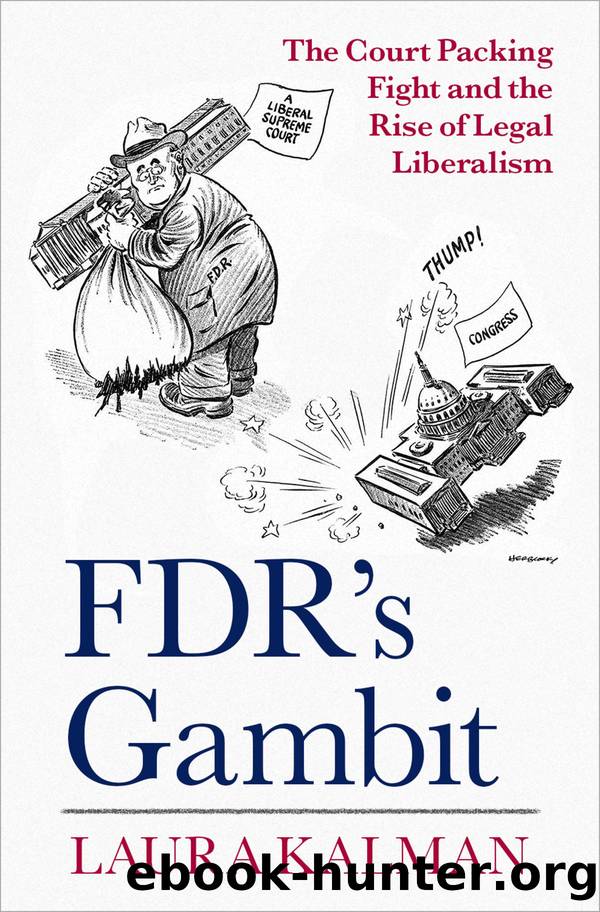FDR's Gambit by Laura Kalman;

Author:Laura Kalman;
Language: eng
Format: epub
Publisher: Oxford University Press USA
Published: 2022-03-15T00:00:00+00:00
Court Packing in âHistoryâ: Battles and Wars
How did the lost battle of court packing affect FDRâs other wars? Whether Roosevelt was the victor depends on where we lookâthe executive, legislature, or judiciary. It also depends on how we define the court fightâs purpose. Some might call the outcomes dysfunctional.
By August 1939, Roosevelt had named three new justices and a number of distinguished liberals to the courts of appeal. Since 1936, decisions adverse to the administration had become rare, and Hughes and Roberts had sided with the majority some of the time. Notably, the court had upheld the constitutionality of the Public Utility Holding Company Act of 1935. It had sustained the Tennessee Valley Authority against another constitutional challenge. As the Roosevelt circle had always urged, it had established the principle of deferential review of the administrative agenciesâ decisions, âparticularly the new ones that were the product of the New Deal itself,â though the court had not always smiled on the National Labor Relations Board. The justices had hollowed out Butler and sustained marketing quotas for tobacco under the Agricultural Adjustment Act of 1938. They had revolutionized civil procedure by eliminating the substantive federal common law in a decision that, Felix Frankfurter wrote, âoverruled a particular way of looking at law which dominated the judicial process long after its inadequacies had been laid bareâ and conceived of law âas a âbrooding omnipresenceâ of Reason.â In U.S. v. Carolene Products, they had also begun to lay the framework for a new constitutional order in which the legislatures and administrative agencies would regulate the economy unimpeded and the federal courts would concentrate to an even greater extent on the protection of civil liberties and civil rights.26
In an indication of how much power had shifted from Wall Street to Washington, the American Bar Association (ABA) had unanimously selected the legendary Frank Hogan, founder of the DC firm of Hogan & Hartson, as its president for 1938â39. He would encourage the romance between conservative lawyers and civil libertarians that the court bill had kindled. In his address to the ABA at his termâs end, he seemed uncertain that the justices would contribute much to the relationship. He warned that their latest decisions meant that âthe American people must look to the legislature rather than the judiciary for the preservation of those liberties which can be preserved only by the observance of limitations upon the exercise of power.â The judiciaryâs move âaway from long established constitutional doctrines to newly announced constitutional conceptsâ guaranteed a âtremendousâ growth in federal power. âThe outstanding point,â Hogan maintained, âis that by recent judicial construction the power to regulate interstate commerce has brought within the ambit of Federal control most if not all activities of the Nation.â27
Perhaps these developments accorded with the will of the people, Hogan admitted, but that just underscored the need to achieve them by constitutional amendment. âThe new concept seems to be that it would be useless labor to seek to amend the Constitution in the method provided in the Constitution.
Download
This site does not store any files on its server. We only index and link to content provided by other sites. Please contact the content providers to delete copyright contents if any and email us, we'll remove relevant links or contents immediately.
2010-The City & the City by China Miéville(1827)
Anatomy of Injustice by Raymond Bonner(1521)
That Every Man Be Armed by Stephen P. Halbrook(1473)
ADHD on Trial by Michael Gordon(1462)
Injustices by Ian Millhiser(1403)
You Don't Own Me by Orly Lobel(1357)
Tell by Major Margaret Witt(1311)
Course Correction by Ginny Gilder(1292)
A Vast Conspiracy by Jeffrey Toobin(1250)
Broken Scales by Joel Cohen(1232)
First by Evan Thomas(1179)
J by Howard Jacobson(1174)
Without Copyrights by Spoo Robert(1174)
A Religious Orgy in Tennessee by H.L. Mencken(1151)
The Run of His Life: The People v. O. J. Simpson by Jeffrey Toobin(1138)
A Triumph of Genius: Edwin Land, Polaroid, and the Kodak Patent War by Ronald K. Fierstein(1113)
A History Of Thailand by Baker Chris(1096)
John Wayne Gacy by Judge Sam Amirante(1032)
Law 101: Everything You Need to Know About American Law, Fourth Edition by Jay Feinman(1025)
